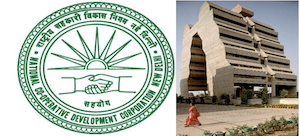👩👩👦👦 Cooperative Institutes
Learn about Cooperative Sector Institutions
NAFED

- National Agricultural Cooperative Marketing Federation was established in
2nd October 1958. - NAFED is registered under the Multi State Co-operative Societies Act.
- NAFED was setup with the object to promote Co-operative marketing of agricultural produce to benefit the farmers.
- Agricultural farmers are the main members of NAFED, who have the authority to say in the form of members of the General Body in the working of NAFED.
- The State Level Marketing Federations and National Co-operative Development Corporation are its members.
- H.Q.
New Delhi - It is an
apex organization for marketing cooperatives in country. - It deals with the procurement, processing, distribution, export and import of selected agricultural commodities.
- Since 1991, NAFED has been designed as nodal agency for undertaking price support operations for
oilseedsandpulseson a regular basis. - Also undertake price support operation of perishable commodities like onion.
National Cooperative Development Corporation (NCDC)

- Established by an Act of Parliament in 1962 as statutory Corporation under the Ministry of Agriculture & Farmers Welfare. Came into force in
1963. - H.Q. New Delhi
- The corporation focuses on programmes of promoting, strengthening and development of farmers cooperatives for marketing, processing and storage of agricultural products as also supply agricultural inputs and essential consumer goods in rural areas.
- It provides financial assistance to cooperative societies thorough or on the guarantee of the state governments.
TRIFED

- Established in
1987. - Under Ministry of Tribal Affairs, GoI.
- Tribal Cooperative Marketing Federation (TRIFED) is a national level cooperative federation responsible for marketing development of tribal products and handicrafts.
Agriculture Inputs Related Acts

Recent Policies
- The Union cabinet announced a
Rs 1 lakh crorescheme to increase foodgrain storage capacity by 70 million tonnes in the cooperative sector in the next five years. (June, 2023) - This is “World’s Largest Grain Storage Plan in Cooperative Sector” aligns with the Prime Minister’s vision of transforming cooperatives into successful and vibrant business enterprises. By leveraging the strength of PACS and establishing agri-infrastructure at their level, the plan aims to enhance the agricultural and rural landscape of the Indian economy.
- With over 1,00,000 PACS and a massive member base of more than 13 crore farmers, this initiative will empower PAC to become robust economic entities and drive positive change at the grassroots level.
- Government will spend this amount in the next five years which would make it world’s largest grain storage plan in the cooperative sector.
- As per the plan, the cooperatives will set up decentralized storage facilities across the country.
- A godown of a capacity of 2000 tonnes will be constructed in every block.
Current Status
- Currently, the food grain storage capacity in the country is about 145 million tonne.
- The programme aims to raise India’s foodgrain storage capacity by 70 million tonne in the cooperative sector. In the next five years, the storage will expand to 215 million tonne.
- India produces about 310 millon tonne of foodgrains a year.
- The country’s current godown facilities can store only up to 47% of the produce.
Implementation
- The scheme plan aims to converge various schemes of the Ministry of Agriculture and Farmers Welfare, Ministry of Consumer Affairs, Food and Public Distribution, and Ministry of Food, Processing Industries.
- The plan will utilize the allocated funds from identified schemes of the ministries involved.
- These include the Agriculture Infrastructure Fund, Agricultural Marketing Infrastructure Scheme, Mission for Integrated Development of Horticulture, Sub Mission on Agricultural Mechanization, Pradhan Mantri Formalization of Micro Food Processing Enterprises Scheme, Pradhan Mantri Kisan Sampada Yojana, allocation of food grains under the National Food Security Act, and procurement operations at Minimum Support Price.
- In order to ensure proper execution of the program, an Inter-Ministerial Committee comprising of representatives from multiple ministries, such as the Ministry of Agriculture and Farmers Welfare, the Ministry of Consumer Affairs, Food and Public Distribution, and the Ministry of Food Processing Industries, will be formed.
- This committee will foster cooperation and coordination among these ministries.
- The government’s objective is to maximize the effectiveness of the cooperative sector’s storage strategy by merging the efforts of these ministries.
- To ensure efficient and timely implementation of the plan, the Ministry of Cooperation will carry out a pilot project in at least 10 selected districts across different states and union territories.
- This pilot project will provide valuable insights into the specific regional requirements, which will be incorporated into the nationwide implementation of the plan.
- The implementation of the plan will be overseen by a National Level Coordination Committee, and guidelines will be issued within 15 days of the Cabinet approval.
- A dedicated portal for the linkage of PACS with the government and state governments will be rolled out within 45 days.
- The proposal’s implementation is expected to commence within 45 days of the Cabinet approval.
Major Advantages
- It will expands food grain storage facilities in the country which will reduce the burden on Food Corp of India (FCI)
- It will provide boost to the cooperative sector
- Reduce the wastage of farm produce
- Help farmers plan their sales better and avoid any distress sale. Hence helping farmers Realise better prices for their goods.
- Reduce import dependence.
- Create employment opportunities in rural India.
- The farmers, apart from storing their produce in the facilities, will also be able to get up to 70% loans from these societies.
- This will lead to significant savings in transportation costs also, due to deceltralisation.
- The new move will be a win-win for both agricultural societies and farmers as well as consumers.
NAFED

- National Agricultural Cooperative Marketing Federation was established in
2nd October 1958. - NAFED is registered under the Multi State Co-operative Societies Act.
- NAFED was setup with the object to promote Co-operative marketing of agricultural produce to benefit the farmers.
- Agricultural farmers are the main members of NAFED, who have the authority to say in the form of members of the General Body in the working of NAFED.
- The State Level Marketing Federations and National Co-operative Development Corporation are its members.
- H.Q.
New Delhi - It is an
apex organization for marketing cooperatives in country. - It deals with the procurement, processing, distribution, export and import of selected agricultural commodities.
- Since 1991, NAFED has been designed as nodal agency for …
Become Successful With AgriDots
Learn the essential skills for getting a seat in the Exam with
🦄 You are a pro member!
Only use this page if purchasing a gift or enterprise account
Plan
Rs
- Unlimited access to PRO courses
- Quizzes with hand-picked meme prizes
- Invite to private Discord chat
- Free Sticker emailed
Lifetime
Rs
1,499
once
- All PRO-tier benefits
- Single payment, lifetime access
- 4,200 bonus xp points
- Next Level
T-shirt shipped worldwide

Yo! You just found a 20% discount using 👉 EASTEREGG

High-quality fitted cotton shirt produced by Next Level Apparel